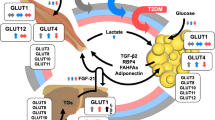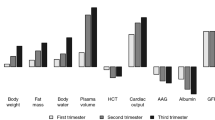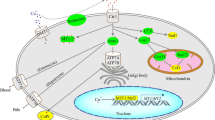Abstract
As the human fetus and placenta are considered to be primarily dependent on glucose oxidation for energy metabolism, the cause of the remarkable association between severe maternal pregnancy complications and the carriage of a fetus with an inborn error of mitochondrial long-chain fatty acid oxidation (FAO) has remained obscure. We analysed human term placenta and chorionic villus samples for the activities of a variety of enzymes involved in FAO, and compared the results with those obtained in human liver. All enzymes were found to be expressed, with a very high activity of two enzymes involved in the metabolism of long-chain fatty acids (CPT2 and VLCAD), whereas the activity of medium-chain acyl-CoA dehydrogenase (MCAD) was found to be low, when compared to liver. These results suggest that fatty acid oxidation may play an important role in energy generation in human placenta, and that a deficiency in the placental oxidation of long-chain FAO may result in placental dysfunction, thus causing gestational complications.
Similar content being viewed by others
REFERENCES
Braida L, Crovella S, Boniotto M, et al (2001) A rapid and quantitative mass spectrometry method for determining the concentration of acylcarnitines and aminoacids in amniotic fluid. Prenat Diagn 21: 543-546.
Carter AM (2000) Placental oxygen consumption. Part I: in vivo studies a review. Placenta 21(supplement A): S31-S37.
Chakrapani A, Olpin S, Cleary M, Walter JH, Wraith JE, Besley GT (2000) Trifunctional protein deficiency: three families with significant maternal hepatic dysfunction in pregnancy not associated with E474Q mutation. J Inherit Metab Dis 23: 826-834.
den Boer MEJ, Wanders RJA, Morris AAM, IJlst L, Heymans HSA, Wijburg FA (2002a) Long-chain 3-hydroxyacyl-CoA dehydrogenase deficiency: clinical presentation and follow-up of 50 patients. Pediatrics 109: 99-104.
den Boer MEJ, Dionisi Vici C, Besley GTN, van Thuijl AOJ, Wanders RJA, Wijburg FA (2002b) MTP deficiency: a fatty acid oxidation disorder with a severe phenotype with prominent cardiac involvement. J Inherit Metab Dis 25(supplement 1): 75.
Granger JP, Alexander BT, Llinas MT, Bennett WA, Khalil RA (2002) Pathophysiology of preeclampsia: linking placental ischemia/hypoxia with microvascular dysfunction. Microcirculation 9: 147-160.
Harris RA, Farmer B, Ozawa T (1972) Inhibition of the mitochondrial adenine nucleotide transport system by oleyl-CoA. Arch Biochem Biophys 150: 199-209.
Herrera E, Gomez Coronado D, Lasunci6n MA (1987) Lipid metabolism in pregnancy. Biol Neonate 51: 70-77.
Herrmann U Jr, Degiampietro P, Metzger E, Bachmann C, Peheim E (1985) Activities in the placenta and fetal membranes of enzymes involved in energy metabolism. Arch Gynecol 236: 249-254.
Ibdah JA, Benett MJ, Rinaldo P, et al (1999a) A fetal fatty-acid oxidation disorder as a cause of liver disease in pregnant women. N Engl J Med 340: 1723-1731.
Ibdah JA, Dasouki MJ, Strauss AW, et al (1999b) Long-chain 3-hydroxyacyl-CoA dehydrogenase deficiency: variable expressivity of maternal illness during pregnancy and unusual presentation with infantile cholestasis and hypocalcaemia. J Inherit Metab Dis 22: 811-814.
Innes AM, Seargent LE, Balachandra K, et al (2000) Hepatic carnitine palmitoyltransferase I deficiency presenting as maternal illness in pregnancy. Pediatr Res 47: 43-45.
Jones CT, Rolph TP (1985) Metabolism during fetal life: a functional assessment of metabolic development. Physiol Rev 65: 357-430.
Knipp GT, Liu B, Audus KL, Fujii H, Ono T, Soares MJ (2000) Fatty acid transport regu-latory proteins in the develo** rat placenta and in trophoblast cell culture models. Placenta 21: 367-375.
Knopp RH, Herrera E, Freinkel N (1970) Carbohydrate metabolism in pregnancy. VIII. Metabolism of adipose tissue isolated from fed and fasted pregnant rats during late gestation. J Clin Invest 49: 1438-1446.
Matern D, Schehata BM, Shekhawa P, Strauss AW, Bennett MJ, Rinaldo P (2001) Placental floor infarction complicating the pregnancy of a fetus with long-chain 3-hydroxyacyl-CoA dehydrogenase (LCHAD) deficiency. Mol Genet Metab 72: 265-268.
Meschia G, Battaglia FC, Hay WW, Sparks JW (1980) Utilization of substrates by the ovine placenta in vivo. Fed Proc 39: 245-249.
Moore KH, Dandurand DM, Kiechle FL (1992) Fasting induced alterations in mitochondrial palmitoyl-CoA metabolism may inhibit adipocyte pyruvate dehydrogenase activity. Int J Biochem 24: 809-814.
Morel F, Laquin G, Lunardi J, Duszynski J, Vignais PV (1974) An appraisal of the functional significance of the inhibitory effect of long chain acyl-CoAs on mitochondrial transports. FEBS Lett 39: 133-138.
Prip-Buus C, Pgorier JP, Duee PH, Kohl C, Girard J (1990) Evidence that the sensitivity of carnitine palmitoyl transferase I to inhibition by malonyl-CoA is an important site of regulation of hepatic fatty acid oxidation in the fetal and newborn rabbit. Perinatal devel-opment and effects of pancreatic hormones in cultured rabbit hepatocytes. Biochem J 269: 409 415.
Rakheja D, Bennett MJ, Foster BM, Domiati-Saad R, Rogers BB (2002) Evidence for fatty acid oxidation in human placenta, and the relationship of fatty acid oxidation enzyme activi-ties with gestational age. Placenta 23: 447-450.
Schoeman MN, Batey RG, Wilcken B (1991) Recurrent acute fatty liver of pregnancy associ-ated with fatty-acid oxidation defect in the offspring. Gastroenterology 100: 544-548.
Sims HF, Bracket JC, Powell CK, et al (1995) The molecular basis of pediatric long chain 3-hydroxyacyl-CoA dehydrogenase deficiency associated with maternal acute fatty liver of pregnancy. Proc Natl Acad Sci USA 92: 841-845.
Slama A, Brivet M, Boutron A, Legrand A, Saudubray JM, Demaugre F (1996) Complementation analysis of carnitine palmitoyltransferase I and II defects. Pediatr Res 40: 542-546.
Treem WR, Rinaldo P, Hale DE, et al (1994) Acute fatty liver of pregnancy and long-chain 3-hydroxyacyl-coenzyme A deficiency. Hepatology 19: 339-345.
Treem WR, Shoup ME, Hale DE, et al (1996) Acute fatty liver of pregnancy, hemolysis, elevated liver enzymes, and low platelets syndrome and long chain 3-hydroxyacyl-coenzyme A dehydrogenase deficiency. Am J Gastroenterol 91: 2293-2300.
Tyni T, Ekholm E, Pihko H (1998) Pregnancy complications are frequent in long-chain 3-hydroxyacyl-coenzyme A dehydrogenase deficiency. Am J Obstet Gynecol 178: 603-608.
Van Wijk MJ, Nieuwland R, Boer K, van der Post JA, VanBavel E, Sturk A (2002) Microparticle subpopulations are increased in preeclampsia: possible involvement in vascular dysfunction? Am J Obstet Gynecol 187: 450-456.
Ventura FV, Ruiter JPN, IJlst L, de Almeida IT, Wanders RJA (1996) Inhibitory effect of 3-hydroxyacyl-CoAs and other long-chain fatty acid-oxidation intermediates on mitochondrial oxidative phosphorylation. J Inherit Metab Dis 19: 161-164.
Wanders RJ, IJlst L, Poggi F, et al (1992) Human trifunctional protein deficiency: a new disorder of mitochondrial fatty acid beta-oxidation. Biochem Biophys Res Commun 188: 1139-1145.
Wanders RJA, Vreken P, den Boer MEJ, Wijburg FA, van Gennip AH, IJlst L (1999) Dis-orders of mitochondrial fatty acyl-CoA 3-oxidation. J Inherit Metab Dis 22: 442-487.
Yoneyama Y, Sawa R, Suzuki S, et al (2002) Relationship between plasma malondialdehyde levels and adenosine deaminase activities in preeclampsia. Clin Chim Acta 322: 169-173.
Author information
Authors and Affiliations
Rights and permissions
About this article
Cite this article
Oey, N.A., Den Boer, M.E.J., Ruiter, J.P.N. et al. High activity of fatty acid oxidation enzymes in human placenta: Implications for fetal-maternal disease. J Inherit Metab Dis 26, 385–392 (2003). https://doi.org/10.1023/A:1025163204165
Issue Date:
DOI: https://doi.org/10.1023/A:1025163204165




